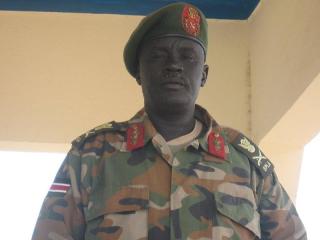South Sudan opposition warns country at risk of disintegration
September 14, 2014 (JUBA) – A senior South Sudanese opposition politician has hinted at the possibility of the young nation disintegrating along ethnic lines should its current leadership ignore the strength and capabilities of those opposed to the Juba establishment.

“We urge our people to see the differences between Dr. Riek Machar, who has accepted to take the challenge to champion the cause of the movement and the propaganda of the government,” Gen. Aturjong said on Sunday.
“They have to make clear distinction and join the movement earnestly so that we all rescue the country from disintegrating into ethnic enclaves, South Sudanese rebel commander,” he added.
David de Chan, a renowned South Sudanese academic, recently criticised the Intergovernmental Authority on Development (IGAD) protocol of agreed principles, instead recommending the breaking up of the country into smaller administrative units.
“I highly recommend that South Sudan should be disintegrated because it has already been disintegrated compared to the island nation state of Cyprus that has divided itself into two (2) vs. the Greco-Cypriots on the west side of the tiny island of Cyprus and the Turkish-Cypriots on the eastside of the island nation of Cyprus and the case of the former Yugoslavia federation that disintegrated into seven (7) nation states in the Balkans,” de Chan wrote on 29 August.
“The greater Upper Nile region would not return to Juba, but it would govern itself as an autonomous region like Kuristan-Iraq in northern Iraq and would eventually seek political divorce from South Sudan,” he said.
GROWING SENTIMENT
But Gen. Aturjong, a former South Sudan army division commander who joined the opposition in May, warned of growing sentiment in the country should the current conflict drag on for another year.
“I do not deny such possibilities and this is why the movement [SPLM in Opposition] appeals for mass defection of our officers in this ailing government to live up to the cause of liberation struggle. Our people did not sacrifice their lives in order for them to come and install the regime with similar tendencies to perpetuate the suffering,” he said.
According to the senior rebel commander, there is already a feeling in other parts of the country, apart from Upper Nile state, allegedly to break away from the country, if president Salva Kiir does not willingly accept democratic reforms and inclusivity in national affairs.
“There are voices calling for annexing the Upper Nile and Unity States to Sudan and parts of Equatoria States to Uganda, Kenya, Ethiopia, Democratic of Republic of Congo and Central African Republic. Such voices are serious and they are actually inspired by the Russia-Ukraine case of Crimea,” Gen. Aturjong explained.
“And I think some countries with interests in the region can quickly support local initiative, like it happened in the case of Russia and Ukraine over Crimea,” he added.
Meanwhile, Peter Adwok Nyaba, a former South Sudanese education minister, now with the rebels, advocated for an increase in the level of struggle to cover other parts of the countries, saying it was the only way to bring change in the country.
He claimed president Kiir was “insensitive” to calls for peace in the young nation.
“SPLM in Opposition does not belong to Riek Machar and those who refused to join because of him are mistaken. The resistance to Salva’s regime is acquiring a national and democratic character,” Nyaba told Sudan Tribune.
“The contradiction now is between democrats’ revolutionary and liberal, social or Marxists and the dictatorial regime and other position or stand is fact support for the president,” he added.
President Kiir’s loyalists, however, say those opposed to the present leadership only became critics after they were removed during last year’s cabinet reshuffle, which also affected former vice-president Riek Machar.
(ST)
